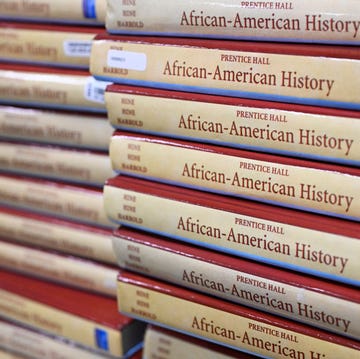In 2021, ABC News journalist Deborah Roberts felt compelled to find a way to celebrate some of our country's most crucial—and under-appreciated—professionals: teachers. By that time, educators had spent more than a year figuring out not only the best approaches to virtual schooling, but also how to keep students engaged and academically on-track—all while attempting to safeguard their own mental and physical health and, for some, help their own kids navigate Zoom school. Underpaid, overworked, and with ever-increasing responsibilities to shoulder, teachers left the profession in droves, resulting in mass staff shortages at schools nationwide that continue to this day.
How did we get here? Roberts began to reflect on how often she mentioned her fifth-grade teacher Mrs. Hardy in speeches and interviews when talking about who or what helped shaped her into the award-winning reporter she is today and wondered if others had similar stories. She began reaching out to friends like Christy Turlington Burns, Oprah, Brook Shields, Misty Copeland, Michelle Williams, and Octavia Spencer, among many others, and each of them had an equally compelling anecdote about a life-changing teacher. When asked if they'd be willing to write essays sharing their experiences, every one of them said yes.
Arriving just in time for Teacher Appreciation Month, Lessons Learned and Cherished: The Teacher Who Changed My Life (Andscape Books) compiles all of their stories into one heart-warming collection of essays, curated by Roberts. "I was overwhelmed by the willingness of people to say, 'yes, I want to do this,'" she shares. "It speaks to the subject matter and how passionately people feel about it."
More From Harper's BAZAAR

Ahead of the book's release, Roberts connected with contributor Turlington Burns to discuss their essays and favorite teachers, the monumental roles educators play in our lives, and what each of us can do to show them we care.
Christy Turlington Burns: So, Deborah, why was this the right time to put this book together?
Deborah Roberts: I've always wanted to write a book about something, because I write for a living, and every time I give speeches or I talk about my life or my career trajectory, I often reference Mrs. Dorothy Hardy, my sixth grade English teacher. I got the idea for the book just chatting with folks, when we were still in the thick of the pandemic and teachers were really up against it. The suggestion initially was, okay, maybe we can do the book in 2024. And I said, "No, this book can't wait. This book has to be done as soon as possible, because teachers need to hear this now.” They needed to be reassured, they needed this big hug from all of us.
I don't have a family of educators like many people do, but I was deeply affected during the pandemic when we all began to help teach our own kids. My son was in high school, and I was helping him with his schoolwork, and I could sort of relate to the job of a teacher. Only then did I realize just how different it is today for teachers than it was when we were growing up, when we saw them as these powerful figures. The notion that they are feeling disempowered and disrespected and disregarded and depressed about their position right now, it affected me. When I started to hear stories like yours and so many others, I thought, wait a second, how is it that we let this idea of teachers as being revered slip away from us?
CTB: You're so right. You’re bringing me back to the pandemic and my own challenges with technology. Teachers had to figure out how to make learning feel meaningful in any way, shape, or form through a screen—I can't even imagine.
DR: Some teachers in disadvantaged communities even stepped outside of their homes and went to go visit students to knock on their doors and see what was happening, to understand why they weren’t showing up on Zoom. You could see that at their core, even with everything going on, teachers still had that spirit. They may not have been acknowledged for that, but the spirit was still there. When I read about some of those teachers, I was blown away.
CTB: Yeah. They had to innovate, and teachers really are on the frontlines of seeing anything unsafe that might be coming from their students’ homes and understanding their students’ social challenges. They’re the true heroes.
DR: What I think is so remarkable is that the stories in the book center how a teacher or an instructor made someone feel and what that did for them internally. You wrote about how you were struggling a little in school and how your teacher Ms. Dane sparked something in you.
CTB: Yes, the first person that came to mind for my essay was my fifth-grade teacher, Ms. Dane. I had moved from California to Miami mid-semester and so I didn't know anyone. I didn’t have a single friend. But the luck of the draw was that I got this amazing teacher. She was really young and definitely felt relatable, but she didn't feel green in any way; she felt strong. I my essay, I describe her style: it was 1979 and she always wore pants or cool skirts. As a young girl I thought, “wow, she's very modern, she's cool.” She had a swagger about her. She didn't take BS from anybody, but I never felt like she was critical of me either. She was stern, but also really encouraging.
I don't think ever had another teacher who was as good of an example of how to assert yourself and how to be confident. She ran a very, very tight ship but at the same time, you wanted to be there, and you wanted to pay attention because of how she engaged the room commanded respect.
DR: There is so much overlap in our essays. I was 11 years old when I met Mrs. Hardy. I had gone to a primarily Black school for years and had felt cloistered in some ways, and then in fourth grade we integrated and started to have different teachers. I had Mrs. Hardy in fifth grade, and she was kind of the opposite of Ms. Dane. She was older, she had white hair, and it was coiffed just right. She had neatly manicured red nails and crisp red lipstick. And she wore dresses and skirts and pantyhose and sensible shoes. She was a very stern looking figure, I mean, very proper and perfect. Her diction was very crisp, and she was very much about poetry and the English language. Everybody was afraid of her, but there was something about her that was so exacting—she had this air of perfection about her that I was drawn to, and I wanted to be a little bit like her, and I wanted to speak like her.
One time she said something to me in that very southern way: "You're a very smart girl." I was off to the races after that. Once I realized that she saw something a little different in me, I began to see myself a little differently too. There was no one magical thing. It was just this overall presence and aura that she had about her. It made me want to please her.
CTB: Oh, that's amazing.
DR: Yeah. Maybe I didn't know that I was destined to be a journalist or anything at the time, but I had such great reverence for the English language and literature and for writing, and she probably stoked that fire in me for the very first time. And then I went on to build on it. So it's very interesting. We had very different teachers, but very similar in the sense that they demanded excellence. Do you think teachers always know the fullness of the impact they have on their students?
CTB: No, and I think certainly not in this environment that we've been speaking about where they continue to not be compensated as they should be. They continue to have more students, more pressure. It must be very hard to be able to look up and take in any of that positivity that might be in the room.
DR: Yeah. The environment you mentioned has gotten more and more dire; half of public schools are struggling to hold onto teachers. It blows my mind that we’ve lost a half million teachers since the pandemic started, and half of teachers are now saying they're planning to quit their career sooner than they would've wanted to. The bottom line is they're feeling undervalued, they're feeling powerless, they're feeling disrespected. That really breaks my heart. I’m hoping this book will be a conversation starter and a reminder to teachers that you all matter, you have always been the backbone of our communities, and we treasure you.
CTB: I love that you're releasing the book during teacher appreciation month.
DR: Yes, and I'm also giving some of the proceeds to DonorsChoose, which is an organization that provides resources for schools particularly in areas that are struggling. I'm excited about that too.
CTB: That's awesome. How else do you think we can make teachers feel appreciated, recognized and supported year-round?
DR: I think we've got to be more vocal. We can't sit on the sidelines and just assume that they know that they're appreciated. I think we've got to find ways to pay them fairly. We've got to be vocal about that in communities with school boards and take an active part in lobbying for teachers. What do you think?
CTB: Yeah, I think you're right. And as parents, we also have a unique responsibility and role to play in terms of modeling that appreciation. Sharing the stories that you've compiled in the book with our kids lets them recognize what a gift teachers are in real time.
DR: I love that. And right now, depending on where you live, teachers are really up against it politically. The educational field has become a hot button issue, because of book bans and arguments over what should be taught. We need to go back to giving teachers more authority.
CTB: Yeah. I'm with you. With gun safety, too, teachers really are, once again, on the frontlines.
DR: It's not fair. The conversation needs to shift, and this is the beginning, I hope.













